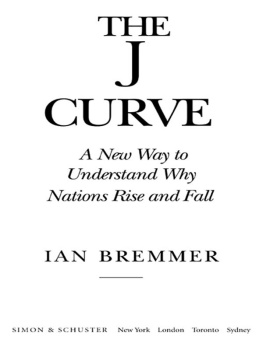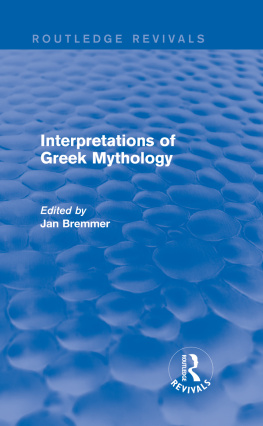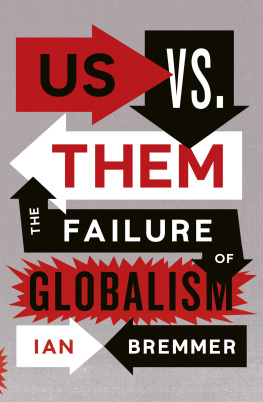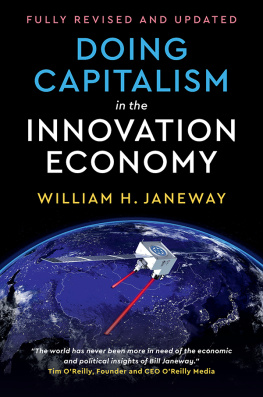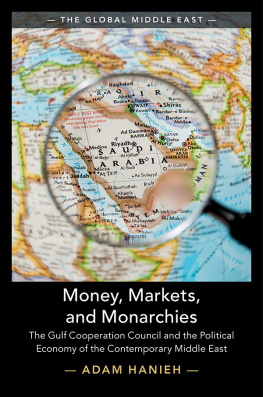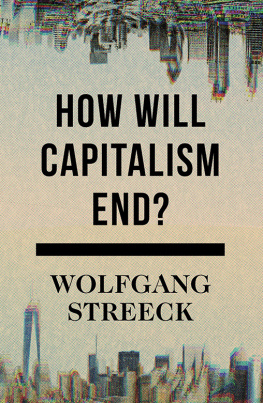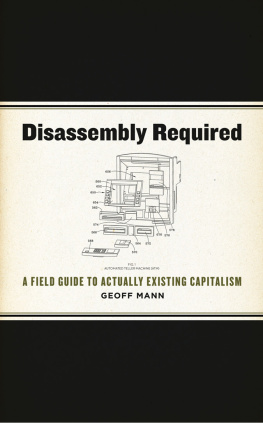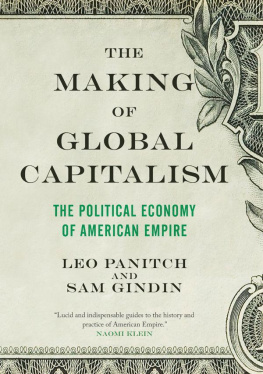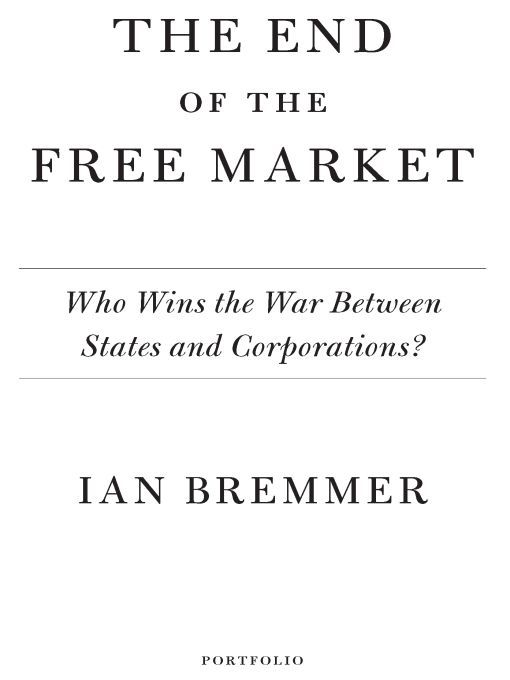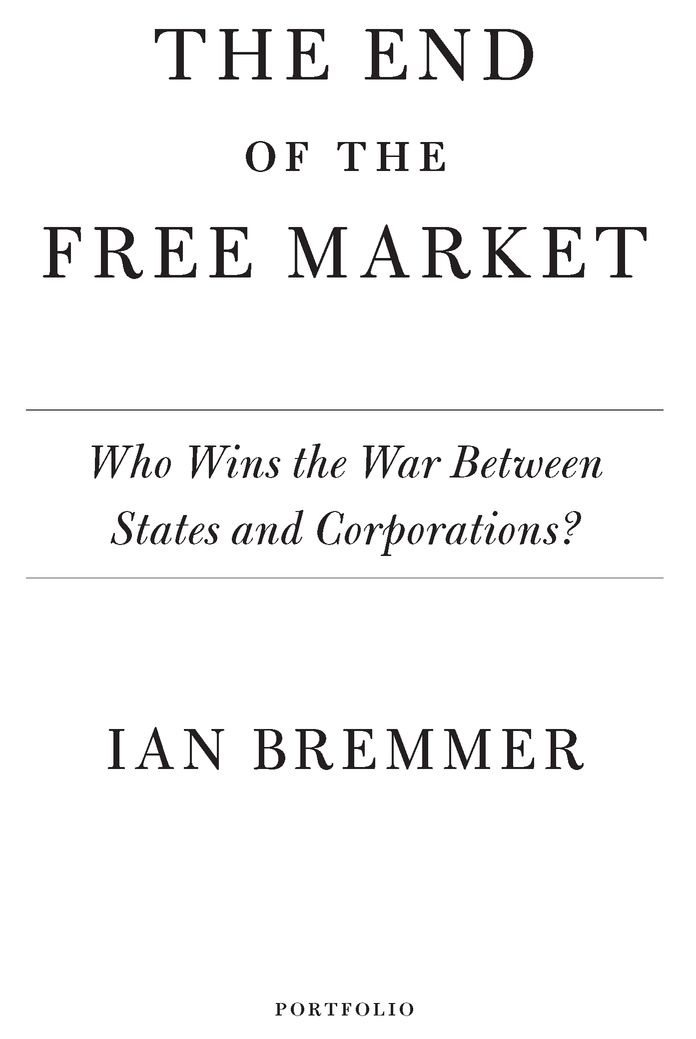Table of Contents
ALSO BY IAN BREMMER
The Fat Tail: The Power of Political Knowledge for Strategic Investing
(with Preston Keat)
The J Curve: A New Way to Understand Why Nations Rise and Fall
Managing Strategic Surprise: Lessons from Risk Management and Risk Assessment
(with Paul Bracken and David Gordon)
New States, New Politics: Building the Post-Soviet Nations (with Raymond Taras)
Nations and Politics in the Soviet Successor States (with Raymond Taras)
Soviet Nationalities Problems (with Norman Naimark)
INTRODUCTION
One Friday afternoon in May 2009, I got an e-mail inviting me to join a small group of economists and scholars to exchange ideas and opinions on the current financial crisis with Chinas Vice Foreign Minister He Yafei. Seven days later, I found myself in a conference room at the Chinese Consulate on Twelfth Avenue in Manhattan, seated directly across from a tall, friendly Chinese diplomat in a well-tailored black suit. Following formal words of welcome delivered in lightly accented English, the smiling vice minister began the meeting with a question: Now that the free market has failed, he asked, what do you think is the proper role for the state in the economy?
His words hung in the air a moment. His mischievously matter-of-fact tone and the enormousness of his assumption almost drew a laugh from me. I caught myself in time, though I doubt my amusement would have offended him. His warmth was genuine, but the question was a serious oneand a quick glance at the headlines offered him plenty of corroborating evidence. For economists, signs of an impending meltdown had begun to accumulate in 2007, but the announcement on September 15, 2008, that the investment bank Lehman Brothers had filed for Chapter 11 bankruptcy protection ensured that the historic scale of the financial crisis could no longer be ignored. Within days, political officials in Washington had assumed responsibility for decisions normally made by markets in New York, a momentous shift in economic and financial power from Americas capital of finance to its capital of politics. On October 3, President George W. Bush signed the Emergency Economic Stabilization Act of 2008, creating the $700 billion Troubled Asset Relief Program. Evidence appeared that global recession had taken hold. As debate intensified over a stimulus package in early 2009, a new president, Barack Obama, warned that if Washington didnt move quickly, America faced a catastrophe. Lawmakers answered the call with a $787 billion rescue plan.
He Yafei waited patiently for an answer. Banks have clearly failed to regulate themselves, but that doesnt demand that government permanently dominate the economy, I responded. Though I can see why political leaders might like the idea, I thought to myself. Robert Hormats of Goldman Sachs, Don Hanna of Citigroup, economist Nouriel Roubini, and others added their views to the mix. Over the next ninety minutes, my American colleagues and I made our case, and Mr. He made his. Each side scored points, and we found some common ground. But as the meeting ended, it was clear we had argued the respective merits of two fundamentally incompatible sets of political and economic principles.
In meetings of much greater consequence now taking place around the world, this inability to agree on the proper role for the state in the performance of markets will change the way we live. The most obvious example comes from the transition from an international bargaining table dominated by heads of state of the G7 group of industrialized nationsall of them champions of free-market capitalismtoward a G20 model that acknowledges the need to allow relative free-market skeptics like China, Russia, Saudi Arabia, India, and others to join the conversation. By fall 2008, the G7 had become an irrelevant institution. The financial crisis made clear that no international body that includes Canada and Italy but excludes China and India can offer credible solutions to todays most pressing transnational problems. In November, with financial panic taking hold in many parts of the world, G20 leaders met in Washington to hash out a workable emergency response. They met again in London in April 2009 to continue to try to negotiate. Today were living in a G20 world, and when leaders of free-market democracies diagnose what ails the global economy and prescribe their respective remedies, they now face the skeptical smile of He Yafeiand of all those across the table who believe that the free market has failed and that the state should play the leading role in national economic performance. Thats an enormous problem, one that will pose important challenges for the next several decades.
How did we get here? Didnt the end of the Cold War signal the final victory of free-market capitalism? On December 25, 1991, a dazed Mikhail Gorbachev looked deeply into the lens of a single television camera and told his people that they were living in a new world. Proud that he had helped guide the Soviet people toward the market economy, he resigned as Soviet president, shuffled the papers before him, and waited for aides to signal that he was off the air. Six days later, the Soviet Union went out of business. Within three weeks, Chinese leader Deng Xiaoping had embarked on his famous southern tour, which created new momentum behind free-market reform in China. Within a year, even Fidel Castro had accepted the need for a little capitalist experimentation. Former Warsaw Pact states began the march toward membership in NATO and the European Union. Free-market capitalism looked to have permanently carried the day.
But as Russians discovered the hard way over the course of the 1990s, its a long step from a command economy to free-market capitalism. The successor to a state that had once determined which products would be produced in what quantities and how much buyers would pay for them found itself managing the largest estate sale in history. Clever (and sometimes ruthless) business moguls acquired enough overnight wealth to cast doubt on the question of who really ruled Russia. Ordinary citizens, scrambling to adapt and survive, saw a level of corruption, confusion, and chaos they had never imagined. This was not the sort of mixed capitalism found today in the United States or in Europe. This was a brand of laissez-faire, anything-goes capitalism in which markets were regulated by those with the most to gain from exploiting them. Little wonder, then, that as Boris Yeltsin prepared for retirement in 1999, public demand grew sharply across Russia for a return to law and order. Military and security officials led by a former KGB lieutenant colonel named Vladimir Putin stood ready to answer the call.
This is not simply Russias story. The fall of communism did not mark the triumph of free-market capitalism because it did not put an end to authoritarian government. Chinese state officials watched the Soviet collapse and Russias upheaval as if their survival depended on it, and they learned some important lessons. First, they recognized that if the Chinese Communist Party failed to generate prosperity for Chinas people, its days were numbered. Second, they accepted that the state cant simply mandate lasting economic growth. Only by releasing the entrepreneurial energies and innovation within its vast population could China thrive and the party survive. In short, China needed to embrace markets. Third, they saw that once this growth potential was unleashed, the party could only protect its monopoly hold on political power by ensuring that the state controlled as large a share as possible of the wealth that markets generate.


